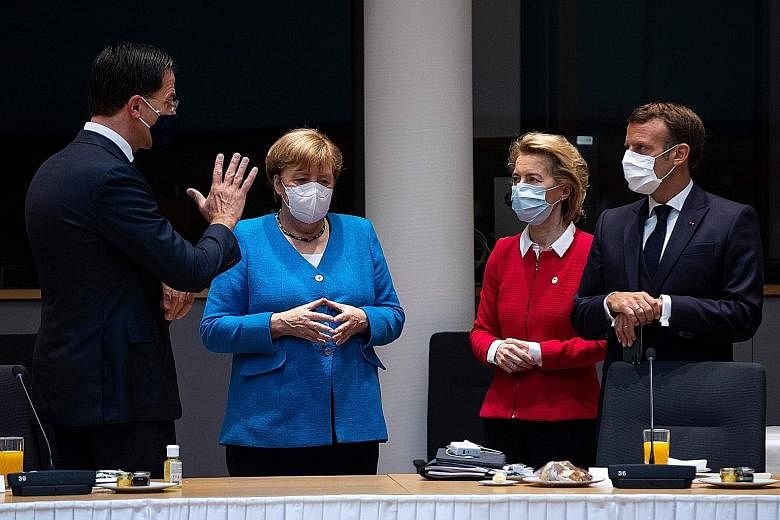BRUSSELS • European Union leaders meeting in Brussels for a second day were closing in on a deal for a €750 billion (S$1.2 trillion) stimulus package yesterday, after the Dutch government indicated support for the direction of the negotiations.
A new proposal - which would keep the overall size of the fund the same but reduce the amount distributed as grants by €50 billion - is a major step in the right direction, according to a Dutch official familiar with the talks, who asked not to be identified because the process is private. The new plan would see €450 billion disbursed as grants.
The new push comes after the first day of negotiations ended in acrimony, leaving the bloc's plan to help its economies heal from the coronavirus pandemic hanging in the balance.
At stake is not just the amount of funds to be given to countries, but also the ability of the EU to offer meaningful solidarity to its 27 members and push through unprecedented financial integration.
Europe is in the depths of its deepest recession since World War II.
Most leaders are seeking a decisive response from the bloc with more than 100,000 Europeans dead from Covid-19 and their economies battered by lockdowns.
Yet sitting together in Brussels for the first time in five months, they spent much of the first day bickering over a Dutch request for a mechanism to allow member states to hold up the disbursal of funds.
In a nod to Dutch demands, the new plan would include a "super emergency brake" that would allow a single member state to hold up a disbursement if it had questions about whether the funds would be used appropriately.
Governments would have three days from when the commission approves a payment to raise their objections and then the matter would have to be addressed by either EU leaders or finance ministers.
Within the EU bloc has been stern resistance from a group of small rich nations led by the Netherlands and Austria that are loath to hand out cash to countries such as Spain or Italy which they see as too lax with public spending.
The Dutch have emerged as the most resistant among members of the so-called "Frugal Four" which also comprise Sweden, Denmark and Austria.
The frugals want any loans or grants to come with strict conditions attached to ensure that heavily indebted countries carry out labour market reform. This is furiously opposed by the southern nations like Italy and Spain.
"If the money is not used to invest in the future, if it does not go hand in hand with necessary reforms in states that are simply broken in their systems... then all this will fizzle out," Austrian Chancellor Sebastian Kurz had warned on the first day of the negotiations.
Elsewhere in the world, G-20 finance ministers and central bankers were yesterday set to commence talks, hosted by Saudi Arabia, aimed at spurring economic recovery from the global recession amid growing calls to widen debt relief for crisis-hit poor countries.
"We are not out of the woods yet," the International Monetary Fund's managing director Kristalina Georgieva said in a message to G-20 finance ministers, warning that the coronavirus pandemic is set to increase poverty and inequality.
Downgrading its growth forecasts, the Washington-based crisis lender last month said it expected global GDP to fall by 4.9 per cent this year due to a deeper contraction during lockdowns than previously anticipated.
The US$11 trillion (S$15 trillion) in stimulus offered by G-20 nations has helped to prevent a worse outcome, but "these safety nets must be maintained as needed and, in some cases, expanded," Ms Georgieva said.
BLOOMBERG, REUTERS











